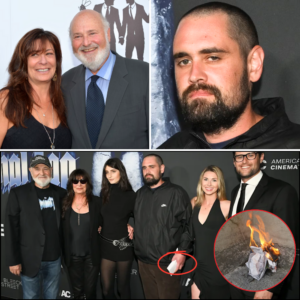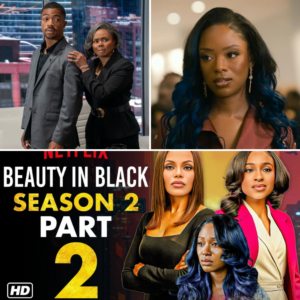In the cutthroat arena of streaming crime dramas, where every heist is a heartbeat away from heartbreak and every family tie threatens to snap like a tripwire, Netflix has detonated a sleeper hit that’s ripping through the charts like a getaway car at full throttle. “Animal Kingdom,” the sun-bleached, blood-soaked saga of a Southern California crime clan, officially landed on the platform in June 2025—and it’s not just streaming; it’s surging. What began as a gritty 2016 TNT adaptation of the 2010 Australian indie film has morphed into a binge beast, catapulting to the Top 10 in over 50 countries within weeks. With six seasons of escalating mayhem, over 75 episodes packed with armored truck smash-and-grabs, backstabbing kin, and skeletons clawing out of beachside closets, fans are howling that it outpaces even “Breaking Bad” in raw, visceral punch. “This isn’t Walter White cooking blue candy,” one Reddit devotee raved. “It’s a pack of wolves tearing each other apart for the alpha spot—harder, messier, and twice as addictive.” As viewership spikes toward 100 million hours watched globally, “Animal Kingdom” isn’t just exploding; it’s reshaping the genre, proving that in the kingdom of crime, blood runs thicker—and deadlier—than water.
The series, developed by Jonathan Lisco and executive-produced by John Wells (the mind behind “Shameless” and “Southland”), draws its feral DNA from the Aussie original, itself inspired by the infamous Pettingill crime syndicate of 1980s Melbourne. But transplanted to the sun-drenched sprawl of Oceanside, California—a fictional stand-in for the real-life surf-and-sin vibe of San Diego’s North County—”Animal Kingdom” sheds any down-under grit for a glossy, adrenaline-fueled American fever dream. It’s a world where luxury yachts bob mockingly beside dingy motels, and the Pacific Ocean laps at shores stained with the residue of last night’s score. The core premise hooks you from the pilot: Seventeen-year-old Joshua “J” Cody (Finn Cole, channeling a coiled-spring intensity honed in “Peaky Blinders”) arrives at his estranged grandmother’s sprawling beach house after his junkie mother’s overdose. What he finds isn’t a haven—it’s a viper’s nest. Janine “Smurf” Cody (Ellen Barkin, unleashing a career-redefining ferocity) rules the roost as the unyielding matriarch, a chain-smoking siren whose love is as conditional as a loaded Glock. Her four grown sons—each a volatile cocktail of charm, rage, and ruin—are the muscle and madness behind the family’s empire of theft, extortion, and whatever pays the bills.
Season 1 wastes no time plunging J into the fray. Smurf’s brood isn’t just dysfunctional; they’re a Darwinian dynasty, where survival means outfoxing cops, rivals, and each other. Barry “Baz” Blackwell (Scott Speedman, all brooding charisma and hidden agendas) is the adopted eldest, the strategist plotting elaborate heists like a chess master on coke. Andrew “Pope” Cody (Shawn Hatosy, a revelation of smoldering psychosis) is the ex-con black sheep, a hulking artist with a hair-trigger temper and a penchant for pyromania. Craig Cody (Ben Robson, channeling surfer-dude menace) is the adrenaline junkie, funding his party lifestyle with quick-hit robberies and coke-fueled benders. And Deran Cody (initially Jake Weary, later replaced by Christopher back in the role with seamless grit) is the baby, a closeted bartender whose resentment simmers like a slow fuse. As J navigates this shark tank—learning the ropes from Baz’s meticulous planning sessions to Pope’s brutal enforcer runs—the cracks in the facade widen. Smurf’s “gifts” come with strings, her affection laced with manipulation, and J’s outsider gaze soon spots the rot: buried grudges, illicit affairs, and a web of lies that could bury them all.
Without spoiling the labyrinthine twists, the narrative arcs across seasons like a rollercoaster built on quicksand. Early episodes revel in the thrill of the score—the armored car heist gone sideways in a hail of bullets, the yacht invasion that turns a pleasure cruise into a floating slaughterhouse—while peeling back layers of Cody lore. Flashbacks to Smurf’s youth reveal a trail of orphaned siblings and vengeful exes, painting her not as a monster but a survivor who devours to protect. Betrayals cascade like dominoes: Baz’s secret side hustles that pit brother against brother, Pope’s unraveling sanity leading to a mid-season gut-punch that redefines loyalty, and J’s slow-burn ascent from pawn to player, his calculating eyes always three steps ahead. By Season 3, the heat from the feds intensifies, forcing desperate alliances with crooked insiders and rival crews, while family secrets— like the true paternity of key players—erupt like landmines. Seasons 4 and 5 crank the betrayal dial to eleven, with Smurf’s iron grip fracturing under internal coups and external threats, culminating in a power vacuum that turns the beach house into a battlefield. The finale in Season 6 delivers a scorched-earth reckoning, where heists give way to existential gambles, and the kingdom’s survivors emerge scarred but unbowed, echoing the Pettingill legacy of chaos without catharsis.
What elevates “Animal Kingdom” beyond standard heist fare is its unflinching dive into the Cody psyche. This isn’t “Ocean’s Eleven” glamour; it’s the unglamorous grind of laundering blood money through surf shops and fearing every knock at the door. The show masterfully balances pulse-pounding action—choreographed by stunt coordinator Wade Eastwood with visceral realism, from high-speed pursuits along coastal highways to claustrophobic shootouts in fog-shrouded marinas—with intimate gut-wrenches. Directors like John Wells and Daniel Sackheim (of “The Americans”) favor sun-bleached cinematography that contrasts azure waves with crimson violence, while composer Attila Ákos keeps the score taut, all throbbing bass and dissonant strings that mirror the family’s fractured harmony. Thematically, it’s a savage treatise on inheritance: the Codys’ criminality as a genetic curse, passed down like Smurf’s signature pearl necklace, with J embodying the generational pivot toward cold pragmatism. Betrayal isn’t plot fodder; it’s oxygen, fueling arcs that probe addiction, queerness (Deran’s storyline is a raw, unflinching exploration), and the myth of the unbreakable family unit.
The ensemble is a powder keg of talent, each performance a lit match. Ellen Barkin owns the screen as Smurf, her husky drawl and predatory smile masking a vulnerability that humanizes the horror—think Cersei Lannister with a Southern California tan. Shawn Hatosy as Pope is the show’s dark heart, his portrayal of a man teetering on genius and madness earning Emmy whispers in 2025 reappraisals. Finn Cole’s J evolves from wide-eyed ingenue to icy operator, his subtle smirks betraying a soul sold early. Scott Speedman brings brooding depth to Baz, Ben Robson infuses Craig with reckless energy, and Christopher’s Deran adds layers of quiet defiance. Recurring standouts like Leila George as Smurf’s daughter-in-law Catherine and Rigo Sanchez as the family’s enforcer Manny inject fresh venom, while guest arcs—from Denis Leary’s crooked cop to Molly Kunz’s ill-fated love interest—keep the pot boiling. It’s a cast that chews scenery without overacting, their chemistry crackling like live wires.
Production-wise, “Animal Kingdom” was a TNT labor of love, shot on location in Oceanside and San Diego to capture that salt-kissed authenticity—waves crashing as metaphors for inevitable wipeouts. Budgets swelled from $2 million per episode in Season 1 to over $4 million by the finale, funding ever-bolder set pieces: a Season 4 casino vault breach that rivals “Heat,” or Season 5’s multi-car pileup engineered with practical effects over CGI sleight. Writers like John Wells and Craig Mitchell layered in social barbs—gentrification squeezing out old-school crooks, the opioid crisis mirroring the Codys’ personal demons—without preaching, letting the drama do the heavy lifting.
Critics who dismissed it as “soapy crime procedural” in 2016 are eating crow in 2025’s Netflix renaissance. Metacritic’s 72/100 aggregate has surged with retrospective love, Variety calling it “a masterclass in sustained tension, where every score feels personal.” The Guardian dubbed it “the anti-‘Succession’—no boardrooms, just beach brawls, but twice the familial carnage.” On Rotten Tomatoes, Seasons 3-6 hover at 90% fresh, with audiences at 95%, praising the “unpredictable twists that make ‘Breaking Bad’ look linear.” Fans echo the sentiment on X and Reddit: “Hits harder than BB because the stakes are blood, not blue meth,” one tweet stormed, while another confessed, “Binged all six—now I’m paranoid about my own family reunions.” Polarization exists—some gripe at the relentless violence or “woke” elements like Deran’s arc—but the consensus? It’s binge gold, with 13-episode seasons (10 for the pilot) perfect for weekend wipeouts.
The Netflix explosion traces to savvy licensing: Dropped amid summer doldrums, it tapped “Peaky Blinders” alums’ fanbase and algorithm magic, pairing it with “Ozark” and “Narcos” for cross-pollination. By September 2025, it’s logged 85 million hours, outpacing “Squid Game” Season 2’s debut week in non-English markets. Social buzz is feverish—#CodyFamily trending with fan edits of heist montages, theories on J’s endgame flooding forums. International appeal surges in the UK and Australia, where the original film’s cult status amplifies nostalgia. Whispers of a spin-off swirl—perhaps Pope’s prison prequel or J’s solo empire-building—but for now, the kingdom stands complete.
“Animal Kingdom” isn’t for the faint-hearted; its brutality—graphic shootouts, sexual undercurrents, moral ambiguity—earns its TV-MA badge. Yet in a sea of sanitized thrillers, it roars with authenticity, a reminder that true crime dramas thrive on the mess of human bonds. Fans aren’t wrong: It hits harder than “Breaking Bad,” not in scale but in intimacy, turning a beachside soap into a scalpel to the soul. Fire up Netflix, lock the doors, and dive in—because in the Cody world, trust no one, especially family. The heist’s just beginning.




